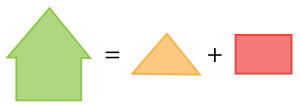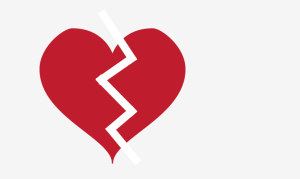Diego posted a link to Matt Might’s article “The Illustrated Guide to a PhD“, which was funny, sad, and many would think is accurate. Since I feel optimistic today, I would like to extend on that with an encouraging note.
While we’re all familiar with “perfect” objects, like a circle, triangle, or square:
 …they’re not the only class of object that can exist. “Ah! I know what you mean”, Kate would say, “but when you look close enough, everything else can be described as a combination of these elements!” And she’d point to this picture of a house.
…they’re not the only class of object that can exist. “Ah! I know what you mean”, Kate would say, “but when you look close enough, everything else can be described as a combination of these elements!” And she’d point to this picture of a house.

And if this is true and all that there is, pushing the boundary of any shape will give us the same inconsequential bulge:
Viewed in this light, the years of anxiety while doing a PhD suddenly become even more of a
—
But there are other things out there. There are things that are not simple sums of elements. Like your local coastline, which looks pretty clean at the moment you jumped out of the plane:
 But as you fall, you started being able to focus on the little cove, and realize that it’s actually more jagged than meets the eye a few seconds ago… and so you keep discovering details as you splatt descend. It never gets simpler.
But as you fall, you started being able to focus on the little cove, and realize that it’s actually more jagged than meets the eye a few seconds ago… and so you keep discovering details as you splatt descend. It never gets simpler.
 This is an example of quasi-fractal objects*. In mathematically fractal objects, there are infinite details, and the details are themselves replicates of the whole:
This is an example of quasi-fractal objects*. In mathematically fractal objects, there are infinite details, and the details are themselves replicates of the whole:
 Julia set images by John Whitehouse, who also kindly provides python code for you to generate Julia/Mandelbrot fractal sets.
Julia set images by John Whitehouse, who also kindly provides python code for you to generate Julia/Mandelbrot fractal sets.
Can we (should we) think of “knowledge” as a quasi-fractal shape, like coastlines, as opposed to a geometrical shape like circles? Thinking of knowledge as a geometrical shape focuses on the uniqueness of the dissertation’s “pinnacle of achievement”, but also burdens it with the tacit acknowledgment is that it is inconsequential to mankind’s body of knowledge. Thinking of knowledge as fractal emphasizes that every feature of the details reflects the whole – a consequence of which is that by studying the details we also learn about the pattern of things we never studied. How true is that?**
Assuming it is objective, are there disciplines that are more “fractal” than others? Assuming it is subjective, are there particular ways of thinking that makes our research more “fractal” than others?
.
.
.
* It can only be quasi-fractal, just as two lines on paper can at best be quasi-parallel. Properties in the real world, in particular, are usually fractal and obeys a power law only within a limited scale.
** Think about how different disciplines evolve. Early archaeologists (Schliemann?) cheerfully dug up and threw away top layers until they reached the ones they wanted; modern excavations are systematic, carefully uncovered, and documented with a stratigraphy. Early programmers cheerfully write more-or-less spaghetti-like code that does just the task they want; software engineers are systematic in their construction of objects and choosing what to expose, and (ideally?) everything is documented ad nauseum. (In a close-to-my-heart example, earlier workers in my discipline cherry-picks data that support a mechanism, and sweep everything else under the carpet.) Does the “fractalness” of knowledge lies in the abilities to impassionately observe and appropriately document (and devising a suitable notation if one does not exist)? Is the fractalness of knowledge the same as the description of “scientific method”? My sense is that I have a different type of appreciation for the “fractalness of knowledge” than when I finished my undergrad (when, being the philosophically-inclined kind since a young age, I’m well-versed in the philosophy of science).


